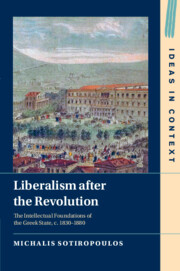Book contents
- Liberalism after the Revolution
- Ideas In Context
- Liberalism after the Revolution
- Copyright page
- Contents
- Acknowledgements
- Note on Transliteration
- Abbreviations
- Introduction
- Chapter 1 Mind the Legal Gap
- Chapter 2 ‘Romanist’ Jurisprudence
- Chapter 3 ‘It’s More Than Economics, Stupid’
- Chapter 4 ‘Let’s Talk about the Nation and the State’
- Chapter 5 The Law of Nations, Sovereignty and the International Autonomy of the Greek State
- Chapter 6 Ideas into Practice
- Conclusion
- Bibliography
- Index
Chapter 2 - ‘Romanist’ Jurisprudence
Liberty, Property and the Virtues of Agrarian Societies (1830s–1850s)
Published online by Cambridge University Press: 01 December 2022
- Liberalism after the Revolution
- Ideas In Context
- Liberalism after the Revolution
- Copyright page
- Contents
- Acknowledgements
- Note on Transliteration
- Abbreviations
- Introduction
- Chapter 1 Mind the Legal Gap
- Chapter 2 ‘Romanist’ Jurisprudence
- Chapter 3 ‘It’s More Than Economics, Stupid’
- Chapter 4 ‘Let’s Talk about the Nation and the State’
- Chapter 5 The Law of Nations, Sovereignty and the International Autonomy of the Greek State
- Chapter 6 Ideas into Practice
- Conclusion
- Bibliography
- Index
Summary
The chapter explores what it calls the ‘Romanist’ or ‘contractual’ liberal current that was to dominate nineteenth-century Greek jurisprudence from the mid-1840s onwards. After exploring the intellectual sources (the historical school of jurisprudence, the French Doctrinaires, as well as the Idéologues) upon which the civil jurists (the ‘Romanists’ as the chapter calls them) drew, and their massive impact on legal thought and civil law, it discusses what the jurists tried to achieve and why they turned to Romanist jurisprudence. As the chapter shows, property reforms had central importance in this current and were strongly related to the transition from a pluralistic legal order (which centuries of Ottoman rule had imposed) to that of a modern and ‘civilised’ state. The chapter also shows that the emphasis on property makes sense only if the issue of the ‘national lands’ (i.e. former Turkish property that had been transformed into Greek state domain) is taken into consideration. It then discusses how, for reasons both economic and cultural/political, the Romanists subscribed to a subversive legislative agenda, conceptualised in the theory of the Rechtsstaat that had significant differences with that envisioned by the monarchical authorities.
Keywords
- Type
- Chapter
- Information
- Liberalism after the RevolutionThe Intellectual Foundations of the Greek State, c. 1830–1880, pp. 70 - 95Publisher: Cambridge University PressPrint publication year: 2022



